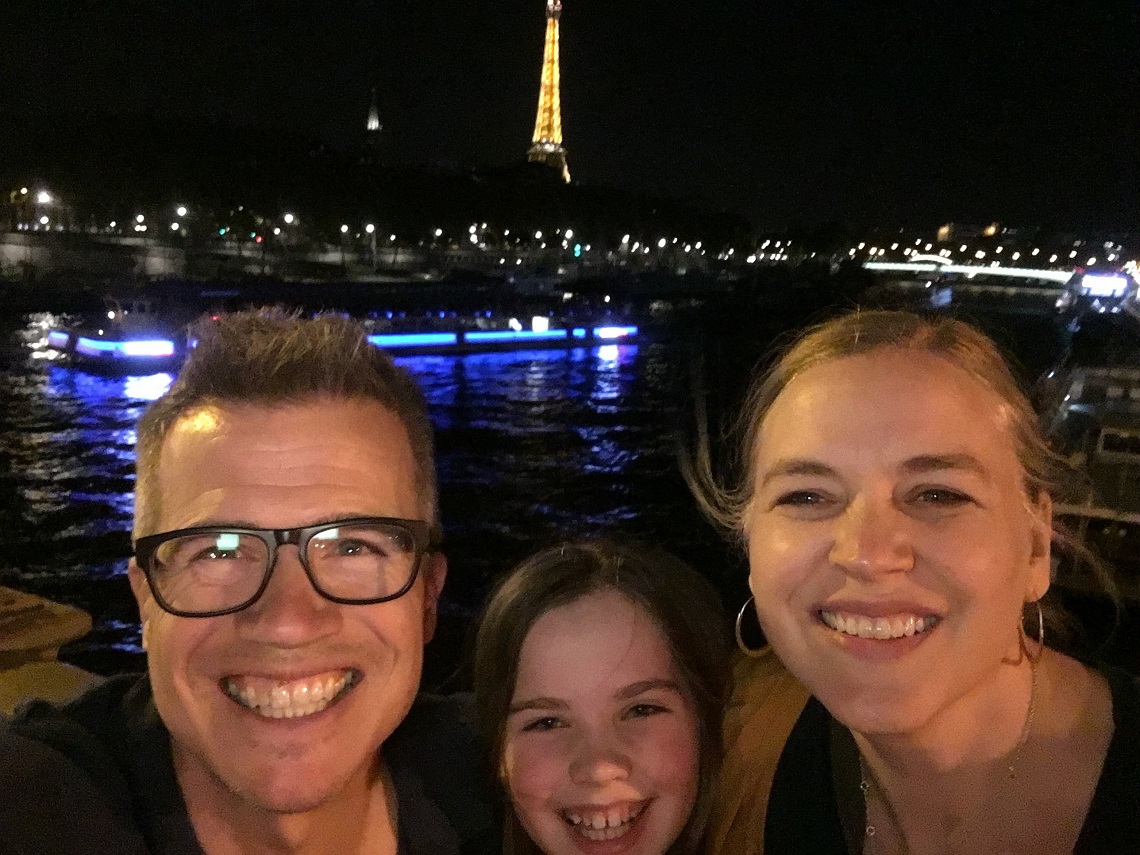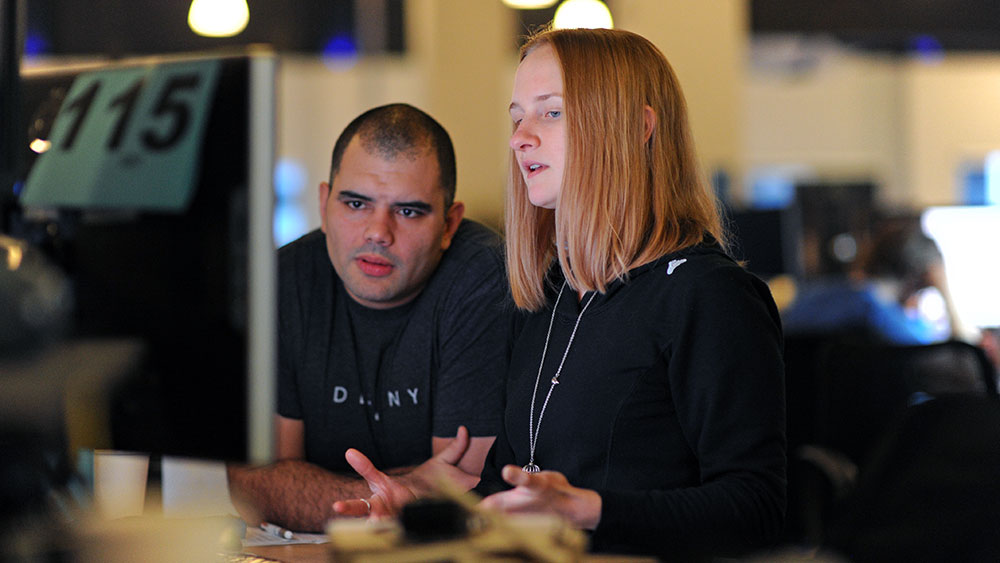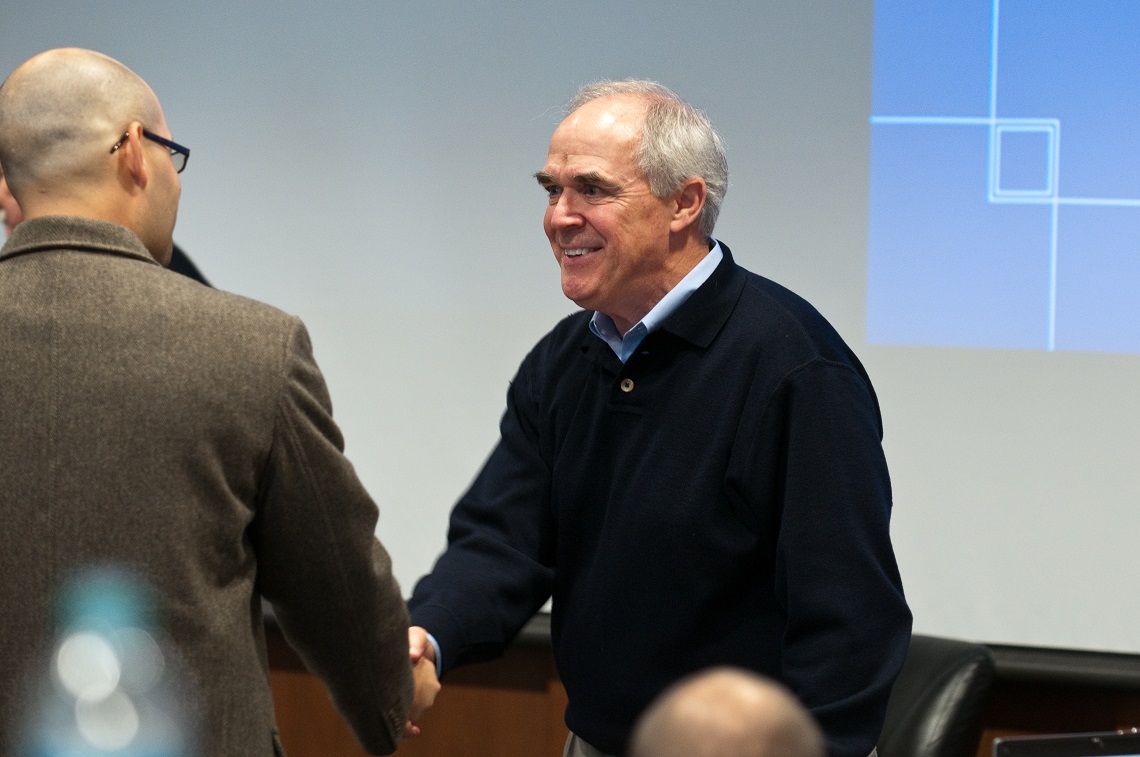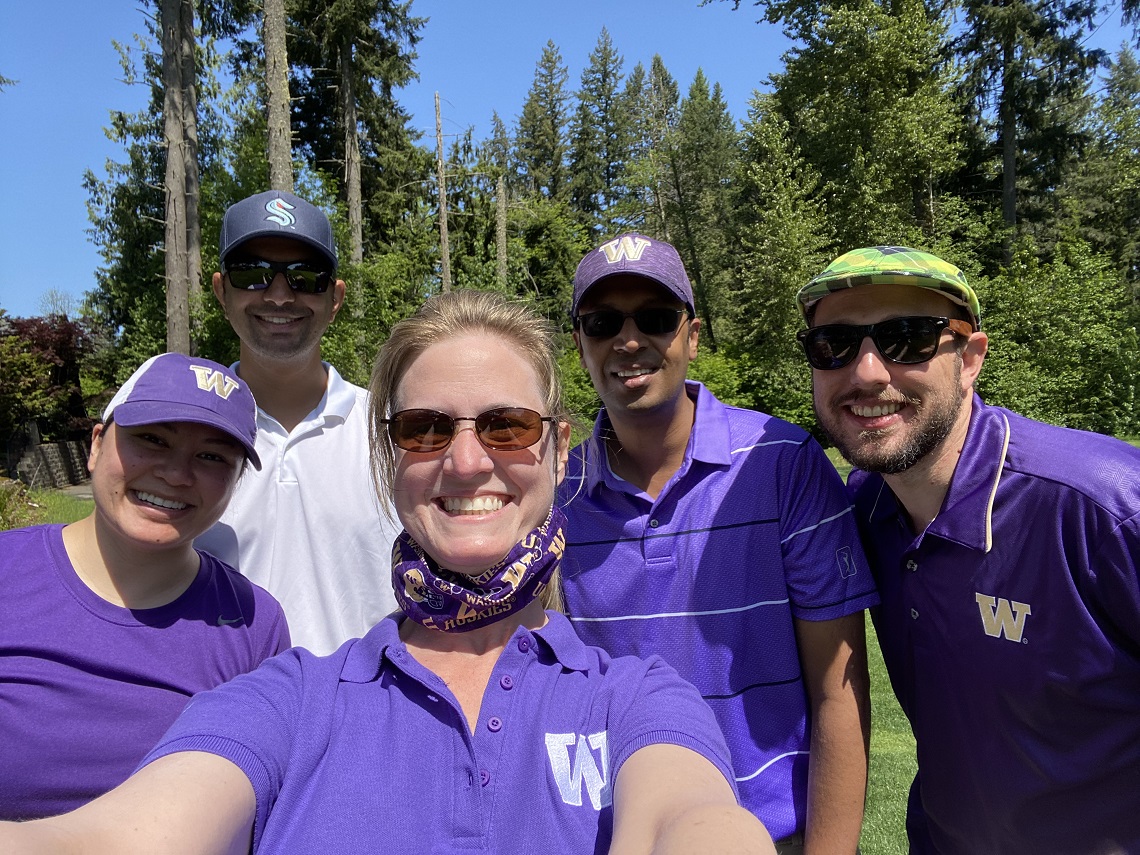TMMBA Class 20
TMMBA @ 20
Foster’s Technology Management MBA Program launched at the dawn of the tech century, and keeps innovating for the future
The year was 2001. Apple introduced iTunes and the iPod. Google launched Image Search. Microsoft released the original Xbox system. New enterprise and personal technologies were emerging constantly, and many people had no idea just how integrated into daily life technology would become.
But for a group of 43 students setting out to earn their Technology Management MBA (TMMBA) at the Foster School of Business, technology was already a passion.
“I think this first cohort of students had the vision to foresee how tech would permeate every aspect of business, and indeed society, in the coming century,” says Erin Aselas (MBA 2010), an alumna and current director of TMMBA.
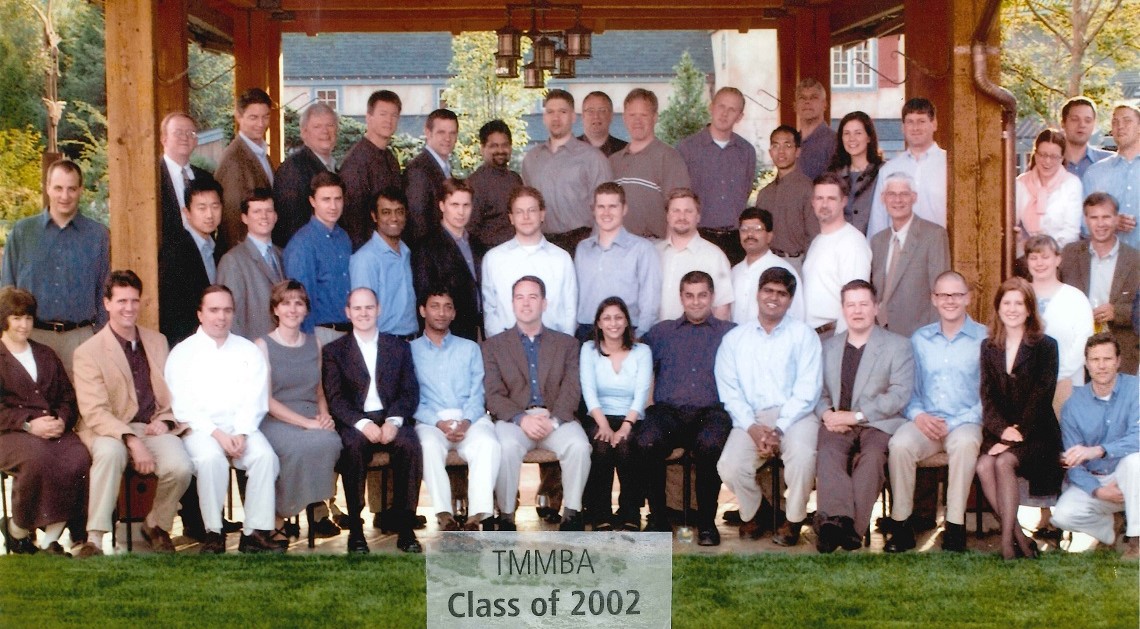
The TMMBA Program was launched that year in response to the tech sector growth in Seattle, Bellevue and Redmond. Much like the sector that inspired its launch, the TMMBA program grew dramatically during those two decades. More leadership development content was added, an Eastside “headquarters” was opened, an entrepreneurship concentration was introduced and, most recently, hybrid courses were integrated.
That original network of 43 TMMBA students is now more than 1,500 alumni strong.
Lens for leadership
A cornerstone of the TMMBA Program is the focus on leadership development. Many of the students coming into the program are engineers or have a background that is more technical in nature, according to Aselas. The exposure to leadership coursework can be profound.
“These classes give our students the skills to really grow and accelerate their career,” Aselas says. “Most enter the program with excellent technical training and experience, and a robust set of ‘hard’ skills. The TMMBA Program’s leadership focus develops students’ soft skill set, such that they are better equipped to level up and bridge that gap between tech and business.”
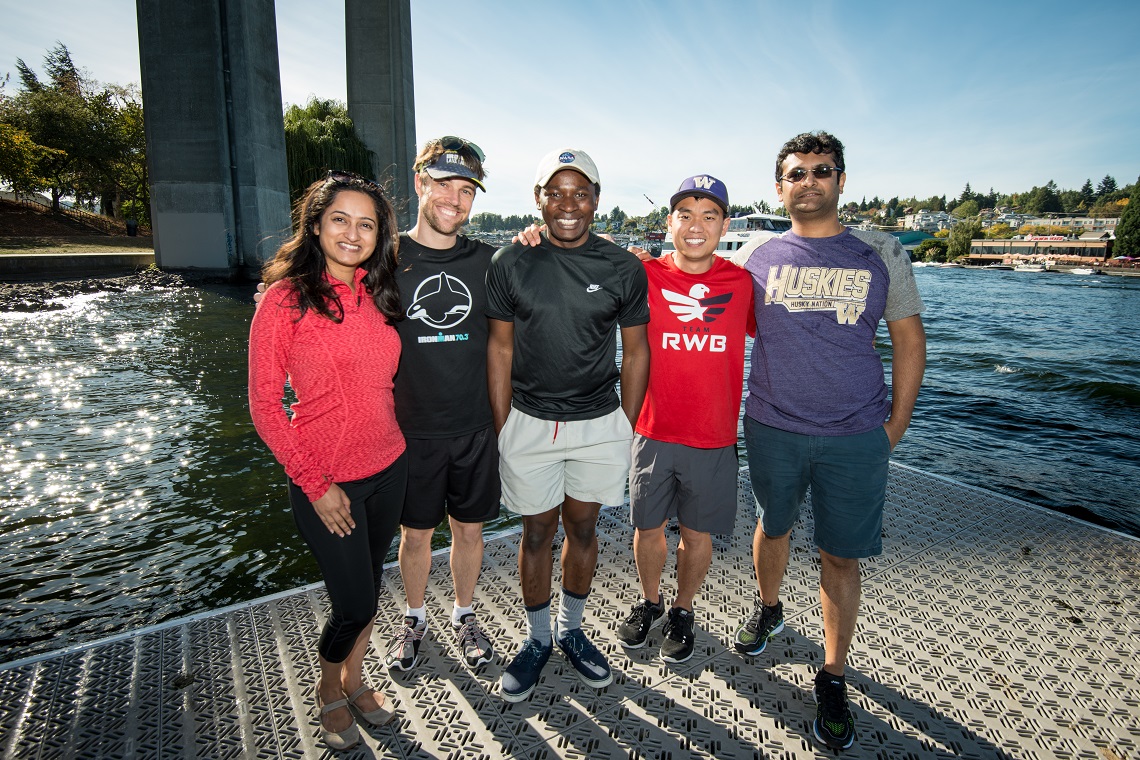
In fact, Aselas has noticed that many students are applying to the program to increase their influence and meaning in what they do rather than simply to get a raise or land a better job.
“I think that’s why the coursework focused on management and leadership development resonates so deeply,” she says. “The sense of agency each feels as a leader engenders immeasurable career satisfaction. The program overall imbues students with the big picture.”
TMMBA provides the MBA fundamentals like learning how to effectively engage finance, marketing and HR teams. But it is the leadership classes that really underscore how and individual personally impacts a team, unit or company.

“Genuine leadership is so much more than just technical mastery of the work,” Aselas adds. “Students truly gain an appreciation for the interpersonal side of business and how it has such a profound impact on a company’s trajectory.”
Frank Hodge, the Orin and Janet Smith Endowed Dean of the Foster School, taught in the program from 2008 to 2012 and noticed how much leadership played into the curriculum and the impact it has on graduates.
“The curriculum prepares them for leadership roles in their companies and their communities. I couldn’t be prouder of the impact the TMMBA Program and its graduates have had on our community and society and beyond,” says Hodge.

The next 20 years
As technology continues to change, so will the TMMBA Program. Aselas says the program is looking to infuse the management of more and new technologies, and finding opportunities to partner with other organizations across the UW campus.
“When we created the TMMBA Program, it was an opportunity to build something unique and different, something that would stand out for its innovative nature and collaborative culture,” says Hodge. “Over the next 20 years we will continue to innovate and challenges ourselves to make the program incrementally better each and every day.”
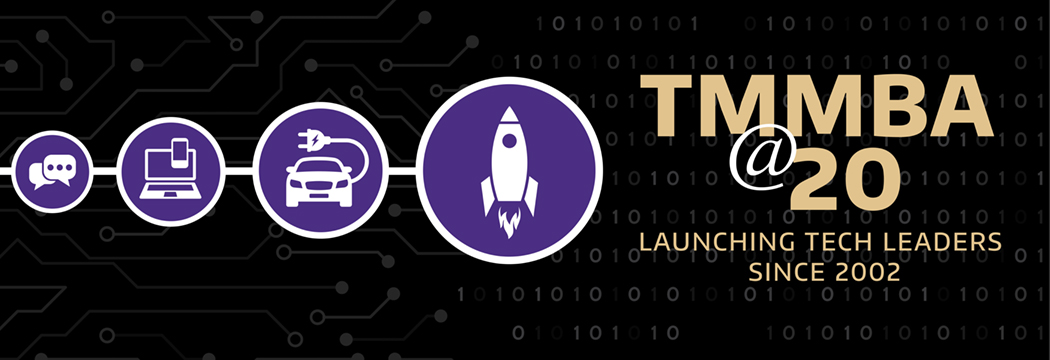
A generation of alumni have transformed their careers and lives in Foster’s TMMBA program. Here are a few of their stories.
Thaddeus Hanscom:
The Tech Adventure
It was the desire for adventure that brought Thaddeus Hanscom (MBA 2004) to the TMMBA Program. He worked at the Seattle Times, managing technology for the newsroom during a time when the company was making some big tech transitions.
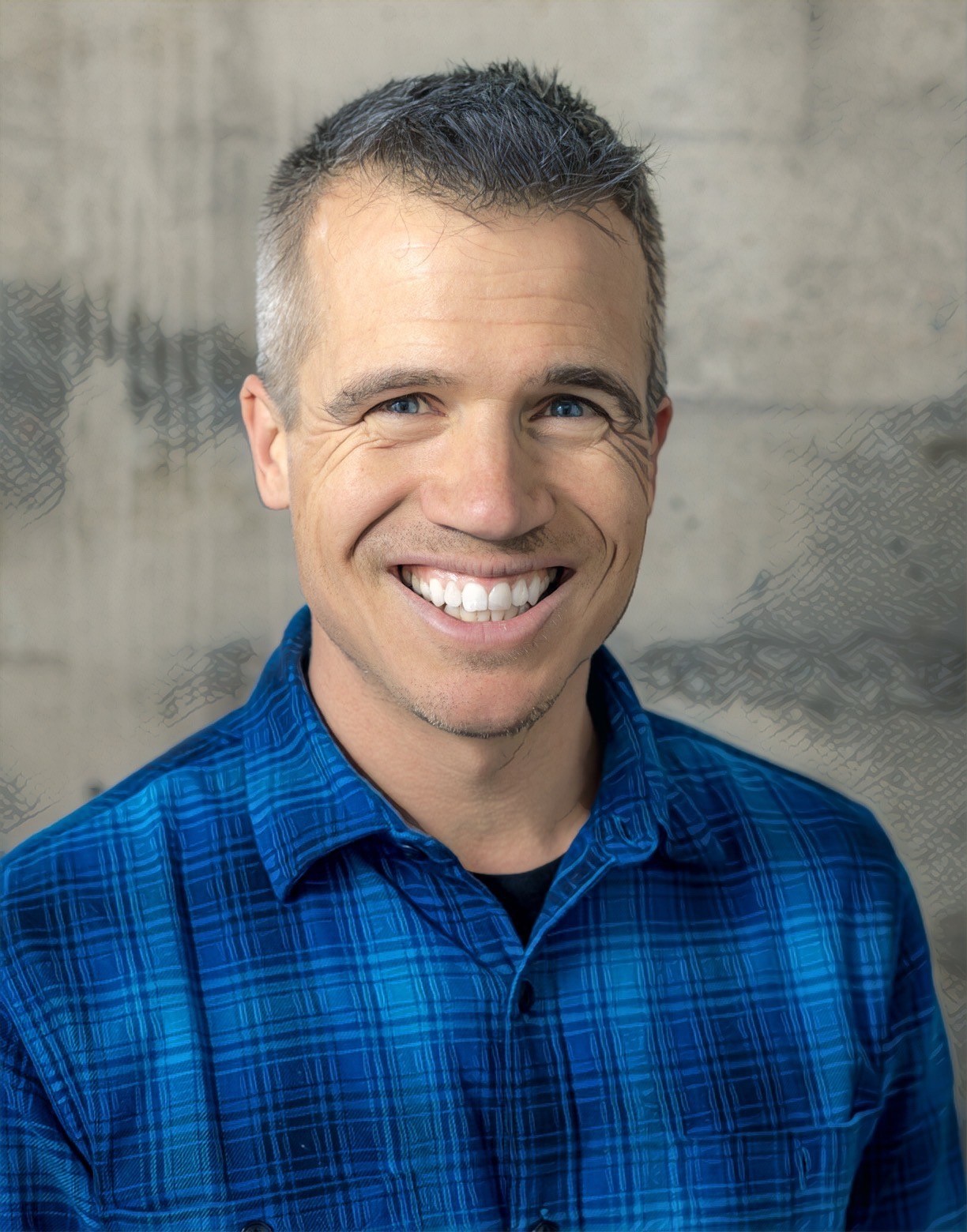
“Reporters were filing stories remotely from palm pilots we’d hacked. Photographers were beginning to use digital cameras. Copy editors were learning how to use a mouse and Microsoft Word,” says Hanscom. “The pace of change was incredible.”
Hanscom didn’t know exactly what he wanted when starting the TMMBA Program, but the TMMBA sounded like an opportunity to grow and prepare for a new adventure.
He found his peers to be the best guides. Seeing how his classmates in different companies and industries faced similar challenges helped him realize that the skills he was developing were translatable. “My peers were broad-minded thinkers,” he says. “What I saw in the TMMBA Program is that there are a lot of different businesses or technology challenges that I could tackle.”
Transferable skill set
Hanscom put his transferable skills to work. After graduation, he went on to work at Expedia for seven years, traveling frequently between Seattle, London, Paris, Munich and destinations across Europe, Latin America and Asia Pacific. He now works as a principal at Amazon, helping build tools and systems to support frontline workers around the world.
One of the things that has helped Hanscom on his career path is the approach to innovative thinking that he learned while in the TMMBA Program.
“Innovation can be perceived as something only geniuses like Jeff Bezos or Steve Jobs can do. But a lot of cool innovation is a combination of customer obsession, experimentation and hard work,” he says. “In the TMMBA Program we talked a lot about how to produce better stuff, faster. Since graduation, I’ve seen how having a test-and-learn mindset can create really amazing experiences for customers.”
Luis Villegas:
Learning the Language
Business leaders sometimes seem to have their own language—a language that contains a mix of strategy, finance, ROI and frameworks. Luis Villegas (MBA 2018) was an engineer writing code and features in the computer gaming industry when he realized he needed to learn a new language to engage with management regarding the decision-making framework.

“I kept asking folks in leadership to explain the decisions to me, and the explanations didn’t make sense, but I couldn’t articulate my objections in a constructive way,” Villegas explains.
This dilemma planted the seed for pursuing an MBA, but he didn’t feel ready to dive in just yet: “It was scary, it felt like a big commitment.”
Taking the leap
After switching companies, Villegas kept going back and forth on whether to continue his education. He eventually took a sample TMMBA class, and that’s when he decided to take the leap.
Villegas found what he was looking for—how to speak the language of business. In mastering that vernacular, he learned important lessons on problem solving.
“Through the examination of real-world business case studies, I saw very innovative and different ways to solve problems,” he explains. “Seeing it in action, seeing how someone thought through (a solution) and executed on it gave me a wealth of knowledge around different perspectives to innovation.”
In the end, Villegas found value in more than learning the language of business. He also learned a lot about leadership, including how to influence without authority.
“This is very sneaky, and the program does this really well,” says Villegas.
Working with two different groups of his peers and no designated leader, he learned how to influence others and work with self-organizing teams where all the members had different needs, strengths and goals. “You can’t talk to the manager if something goes wrong. You have to find compromise, you have to find a way to move forward.”
Leveling up
When Villegas started the program, he had a goal: become a technology executive. Less than three years after graduating, he became the CTO at Bungie, a leading video game developer. In addition to managing and shaping the technology strategy for the entire company, he also serves on the company’s board of directors. Each day, he draws on key lessons learned from the TMMBA Program about the language of business and leadership principles.
“As a member of the board, you need to understand the language, otherwise you don’t know what to ask or how you can challenge the team or challenge management on the decisions they’re making,” says Villegas.
From the CTO perspective, he says, the leadership component of TMMBA changed him forever: “It really changed how I think about leadership, how I think about influencing other people, and setting people up for success so they can do their best work.”.
Having already reached his goal of being a CTO, Villegas is unsure what’s next in his future. He’s thought about starting his own company down the road. But for now, he’s happy leading the technology strategy and building a successful future at Bungie.
“I cannot complain,” he says. “Life is good.”
Padmaja Vrudhula:
It’s All About the People
Padmaja Vrudhula (MBA 2014) didn’t have a specific goal when she started the TMMBA Program in 2013. With several years’ experience working in the tech industry, however, she knew what she wanted to learn.

“One of the things I realized was I didn’t have a lot of experience with management accounting, those higher-level executive reporting capabilities,” she says. “I thought (the TMMBA) might be a good way for me to learn those skills.”
Vrudhula wanted the tools to communicate effectively with her peers. When at the table, she felt colleagues didn’t respond to what she was saying or didn’t give her credibility given the relative age at which she moved into leadership.
“Turns out that decision-making at higher levels isn’t done solely via numbers and spreadsheets,” she explains. “I think this is why I responded so well to the people element of TMMBA, because it gave me the opportunity to understand some of my failures in my career had nothing to do with what I was presenting, but whether I put in the legwork to get people on board behind the scenes before I presented. It was about managing people, not facts.”
Unexpected benefit
That lesson speaks to what the TMMBA experience was like for Vrudhula. She went into the program with one set of goals and came out with a completely different set of skills than she was expecting. The biggest one: becoming a better leader.
She did just that, and is currently a vice president at Snowflake, leading industrial vertical workloads at the cloud computing provider.
“We did a transparent leadership survey, where people comment on your capabilities,” says Vrudhula. “Being able to have conversations about how I operate as a leader was just one of the best experiences for me. I think it’s made me a much better, holistic leader.”
TMMBA mentor network
Those leadership lessons were so impactful that Vrudhula wanted to pay it forward. When the program asked if she wanted to be part of the first cohort of alumni mentors for TMMBA students in 2015, she jumped at the opportunity to help others learn to be better leaders. As a mentor to students, Vrudhula shares the lessons she’s learned, while also learning from her mentees.
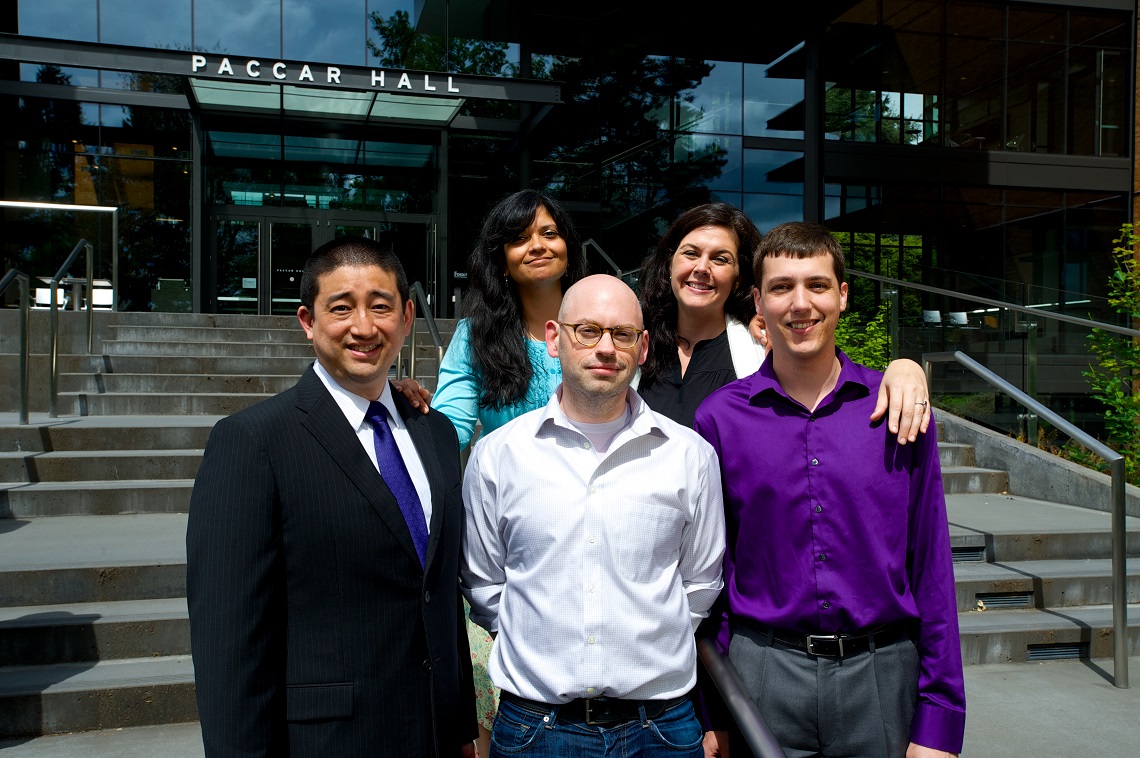
“I have a lot of students that I work with and advocate for. I love hearing what they’re learning and how the classes are changing,” she says. “But it also gives me exposure to the industry they’re in and how the company they’re working for addresses challenges.”
Her number one takeaway for students is that it all comes down to being able to effectively manage people.
“The tech part is the easy part. If you want an executive role, it’s all about the people,” she says. “That was the lesson I had to learn: to leave the data behind and appeal to the motivations that drive people. This has helped me, over the last eight years, to build multiple high-performing teams.”
Read more stories of TMMBA transformations in the Foster Blog.
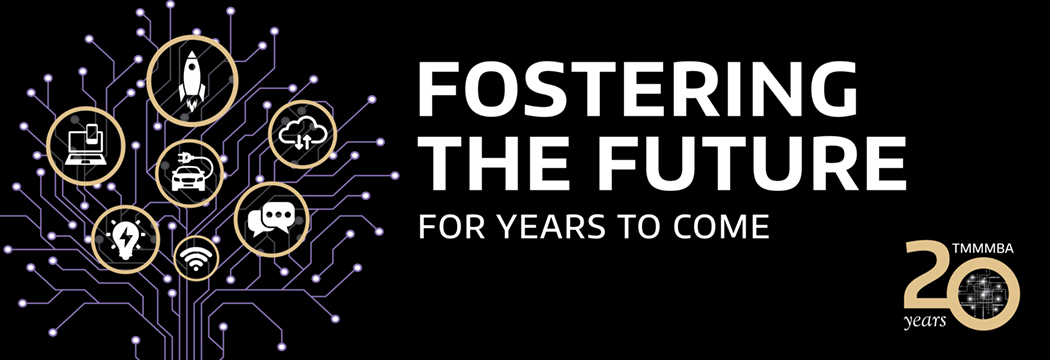
Pat Bettin:
The Leadership Catalyst
Many things have changed over the first 20 years of the TMMBA Program. Pat Bettin, a teaching professor of management, has witnessed all of those changes.
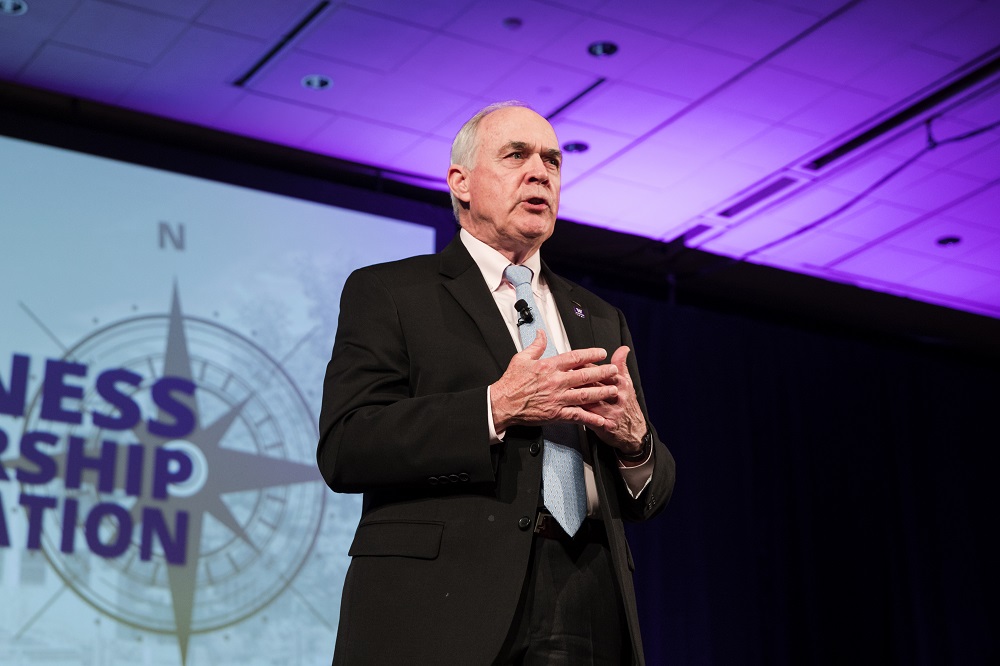
He was teaching in the Foster School’s Executive MBA Program when he was invited to teach a class for the inaugural TMMBA cohort, and he has taught every subsequent cohort.
“The student body is much more diverse now than it was 20 years ago,” he notes. “There are more women and people from various parts of the world.”
TMMBA’s constant
But something that has held steady in the TMMBA Program is its focus on leadership. That’s where Bettin’s lessons come into play.
“If you think of leadership as tapping into the talent and the potential of other people, you need somebody who is going to facilitate their integration to work effectively together,” he explains.
While teaching his students that leading is bringing out the best in others, Bettin is doing the same for his students.
“Pat’s constant focus on leading with the head, the heart and the hands defined my leadership style and helped me find the ideal way to work with and through others,” says Luis Villegas.
“I see the potential in all of these young people to figure out ways to solve some of the important problems that we are facing right now,” Bettin says.
The Bettin Cup
Bettin’s indelible leadership lessons made such a profound impact on TMMBA students that they started a charity golf tournament in his honor. Bettin has always joined the students when they’re eating dinner before classes. “I sit and chat with them, and the conversations are around what people enjoy doing when they’re not working,” he says. “Golf is something I enjoy doing.”
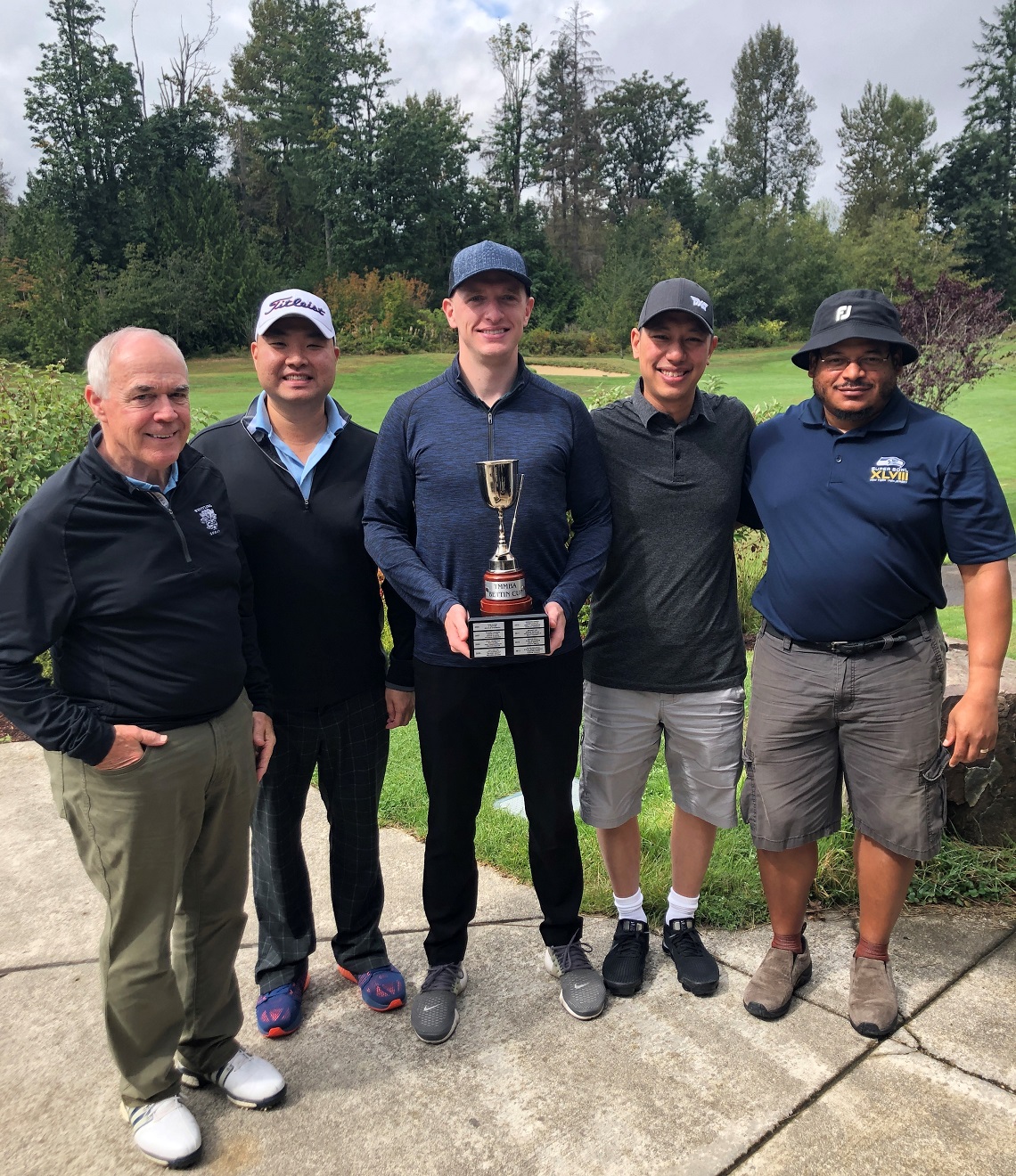
In 2005, a group of students saw a connection between golf and leadership, including acting with integrity and taking risks. With the inspiration coming from Bettin, the students created a golf tournament in his name.
The Bettin Cup started small, and grew into a fundraiser for Treehouse, a non-profit supporting youth in Foster care. It’s also an opportunity for students to learn the game—up to a third of players each year have never golfed before.
While Bettin has had a lasting impact on what leadership means to many TMMBA students, he hopes all of his students take away something a little more personal.
“I hope they realize that they matter, that they make a difference,” he says. “Whether it be in a small team, whether it be influencing up or outward, they make a huge difference.”

